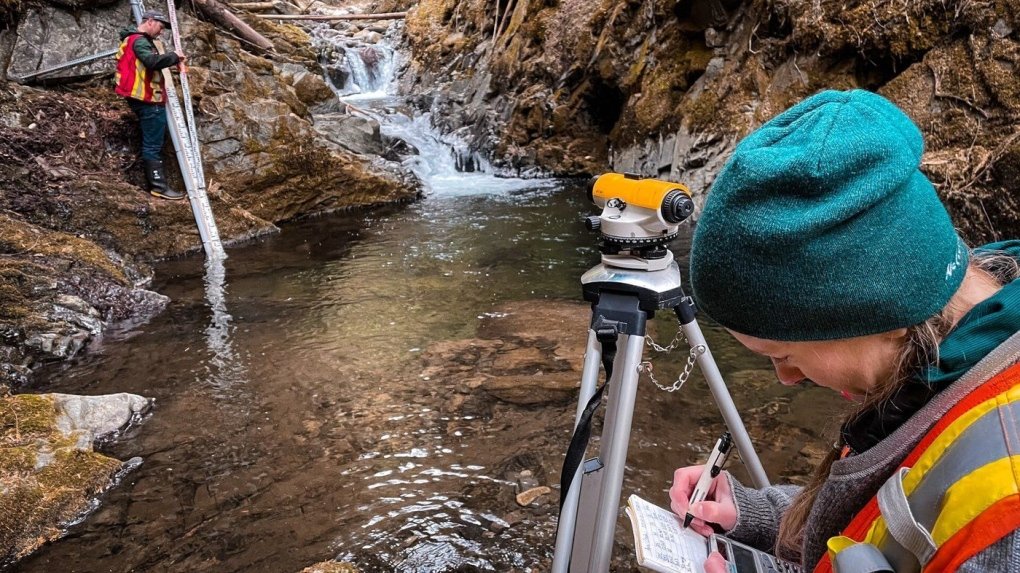CTV - La Colombie-Britannique ne sait pas où vont toutes ses eaux souterraines. Les experts s'inquiètent à l'approche de la sécheresse
"Jepense que les usagers de l'eau et le grand public comprennent de plus en plus que nous entrons dans une ère où nous devrons être beaucoup plus précis et inclusifs lorsque nous prendrons des décisions concernant l'eau, en particulier l'utilisation des eaux souterraines.
Paige Thurston, gestionnaire du programme cadre de surveillance de l'eau du bassin du Columbia, à droite, complète un relevé après une installation hydrométrique sur le ruisseau Apex dans le bassin du Columbia près de Nelson, C.-B., dans cette photo non datée. THE CANADIAN PRESS/HO, Lacs vivants Canada
Cet article publié par Brenna Owen sur CTV News met en lumière les préoccupations croissantes concernant la gestion de l'eau en Colombie-Britannique, en particulier face aux conditions de sécheresse imminentes et aux impacts du changement climatique. Des habitants comme Kat Hartwig, qui a grandi dans la vallée du fleuve Columbia, ont été témoins de changements importants dans la disponibilité de l'eau et les écosystèmes au fil des ans.
Malgré ces observations, l'article souligne les lacunes de la province en matière de surveillance et de réglementation de l'utilisation des eaux souterraines. De nombreux détenteurs de licences d'exploitation des eaux souterraines ne sont pas tenus de déclarer leur utilisation, ce qui entraîne des lacunes dans la compréhension de l'étendue de l'extraction et de ses impacts. Les efforts déployés depuis 2016 pour réglementer l'utilisation des eaux souterraines se sont heurtés à des difficultés, notamment un nombre de licences plus faible que prévu.
L'absence de cartographie et de surveillance complètes des sources d'eau souterraine ne fait qu'exacerber le problème. Des experts comme Oliver Brandes et Mike Wei soulignent l'insuffisance des données et des infrastructures actuelles pour une gestion efficace des ressources en eau. La stratégie de sécurité des bassins hydrographiques de la province vise à résoudre ces problèmes, en mettant l'accent sur l'amélioration de la surveillance et de la collecte de données afin d'éclairer la prise de décision.
Les initiatives communautaires, telles que les efforts de surveillance de l'eau déployés par Lacs vivants Canada dans le bassin du Columbia, soulignent l'importance de l'engagement de la base dans la gestion de l'eau. Toutefois, les coupes budgétaires ont entravé la viabilité de ces programmes, soulignant la nécessité d'un soutien continu de la part du gouvernement.
Nathan Cullen, ministre de la gestion des terres, des eaux et des ressources de la Colombie-Britannique, reconnaît les défis à relever et souligne l'importance de la collaboration communautaire pour faire face à la pénurie d'eau. Il reconnaît la nécessité de disposer de données et de systèmes de surveillance plus complets afin d'éclairer les pratiques de gestion durable de l'eau.
Malgré ces efforts, des inquiétudes persistent quant à la capacité de la province à répondre efficacement à la pénurie d'eau, comme l'ont montré les restrictions d'utilisation de l'eau l'été dernier. Le manque de transparence et d'investissements proactifs dans la gestion de l'eau mine la confiance du public et exacerbe les conflits sociaux en temps de crise.
Dans le contexte de ces défis, le projet Canada1Water (C1W) se distingue comme une initiative essentielle. Ce projet vise à analyser les effets du changement climatique sur les ressources en eau du Canada et offre aux décideurs, aux analystes politiques et aux planificateurs communautaires des outils conviviaux pour relever les défis liés à la garantie d'un approvisionnement durable en eau au cours des décennies et des siècles à venir. En intégrant des données issues de projets tels que C1W, la Colombie-Britannique et d'autres provinces peuvent mieux se préparer et atténuer les effets de la pénurie d'eau et de la sécheresse dans un contexte de changement climatique.
Cliquez ici pour lire l'article sur le site du CTV
"Le rapprochement est la voie à suivre, et c'est ce que nous faisons.C'est pourquoi nous avons déjà entamé ces conversations dans plus de 20 communautés".


